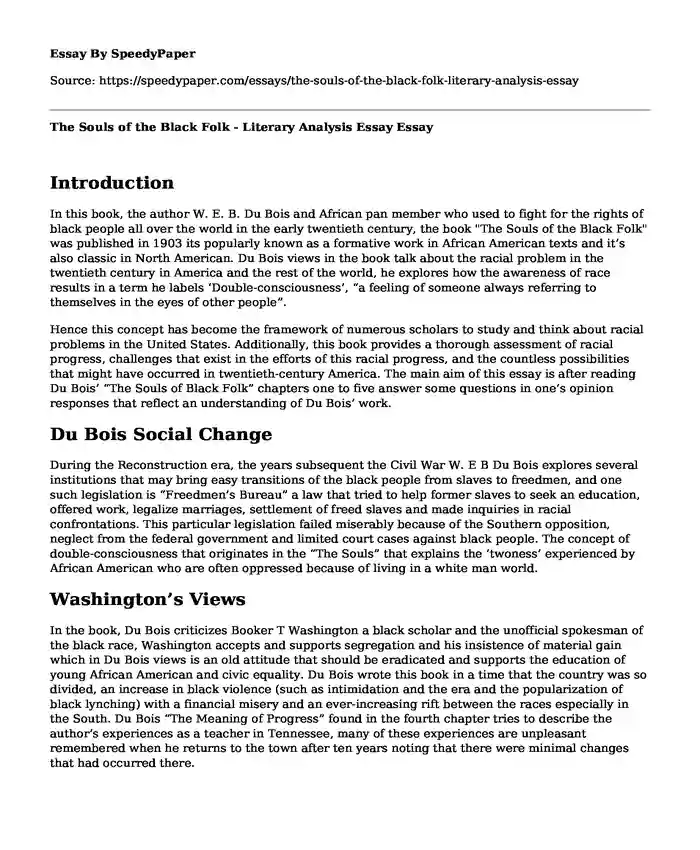
| Type of paper: | Literature review |
| Categories: | Literature Literature review Books |
| Pages: | 3 |
| Wordcount: | 700 words |
Introduction
In this book, the author W. E. B. Du Bois and African pan member who used to fight for the rights of black people all over the world in the early twentieth century, the book "The Souls of the Black Folk" was published in 1903 its popularly known as a formative work in African American texts and it’s also classic in North American. Du Bois views in the book talk about the racial problem in the twentieth century in America and the rest of the world, he explores how the awareness of race results in a term he labels ‘Double-consciousness’, “a feeling of someone always referring to themselves in the eyes of other people”.
Hence this concept has become the framework of numerous scholars to study and think about racial problems in the United States. Additionally, this book provides a thorough assessment of racial progress, challenges that exist in the efforts of this racial progress, and the countless possibilities that might have occurred in twentieth-century America. The main aim of this essay is after reading Du Bois’ “The Souls of Black Folk” chapters one to five answer some questions in one’s opinion responses that reflect an understanding of Du Bois’ work.
Du Bois Social Change
During the Reconstruction era, the years subsequent the Civil War W. E B Du Bois explores several institutions that may bring easy transitions of the black people from slaves to freedmen, and one such legislation is “Freedmen’s Bureau” a law that tried to help former slaves to seek an education, offered work, legalize marriages, settlement of freed slaves and made inquiries in racial confrontations. This particular legislation failed miserably because of the Southern opposition, neglect from the federal government and limited court cases against black people. The concept of double-consciousness that originates in the “The Souls” that explains the ‘twoness’ experienced by African American who are often oppressed because of living in a white man world.
Washington’s Views
In the book, Du Bois criticizes Booker T Washington a black scholar and the unofficial spokesman of the black race, Washington accepts and supports segregation and his insistence of material gain which in Du Bois views is an old attitude that should be eradicated and supports the education of young African American and civic equality. Du Bois wrote this book in a time that the country was so divided, an increase in black violence (such as intimidation and the era and the popularization of black lynching) with a financial misery and an ever-increasing rift between the races especially in the South. Du Bois “The Meaning of Progress” found in the fourth chapter tries to describe the author’s experiences as a teacher in Tennessee, many of these experiences are unpleasant remembered when he returns to the town after ten years noting that there were minimal changes that had occurred there.
Desiree’s Baby
In Du Bois’ description of Atlanta and how many people are interested in worldly things and gaining wealth rather than perfecting race relations and other significant considerations, he argues that African Americans should not only be educated only to earn money but also engage in the human culture standards and life vital ideals. In “Desiree’s Baby” there are several instances of racism with characters staying silent such incidences include; Monsieur Valmonde found Desiree as a child in a stone pillar, and generally cannot realize that Desiree was abandoned, another event is when Armand is interested in Marrying Desiree Valmonde suggests Desiree’s origin be explored with nobody talking about the clear rejection of interracial marriage.
Desiree and Armand's baby brings a clear rift between the couple, and mostly it’s because of the baby’s complexion is black. Even though Du Bois was aware of racial injustices in his time, he was also against being silent and not acting up in the face of these atrocities he disagrees with various views taken by Booker T Washington but goes as far as to call him the spokesman of the black American.
Cite this page
The Souls of the Black Folk - Literary Analysis Essay. (2023, Dec 27). Retrieved from https://speedypaper.com/essays/the-souls-of-the-black-folk-literary-analysis-essay
Request Removal
If you are the original author of this essay and no longer wish to have it published on the SpeedyPaper website, please click below to request its removal:
- Literary Essay Sample: Depiction of Gender Roles in the Play A Doll's House
- Essay Sample on a Literature Search
- Who Is to Blame for Macbeth's Downfall? A Literary Essay Sample
- Close Reading Essay Sample: Sonny's Blues by James Baldwin
- Paper Example on George Orwell's Essay Politics and the English Language
- Essay Example: Reflections on the Film 'The New Scramble for Africa'
- Love Blossoms: Janie's Journey to True Happiness with Tea Cake in 'Their Eyes Were Watching God'
Popular categories




